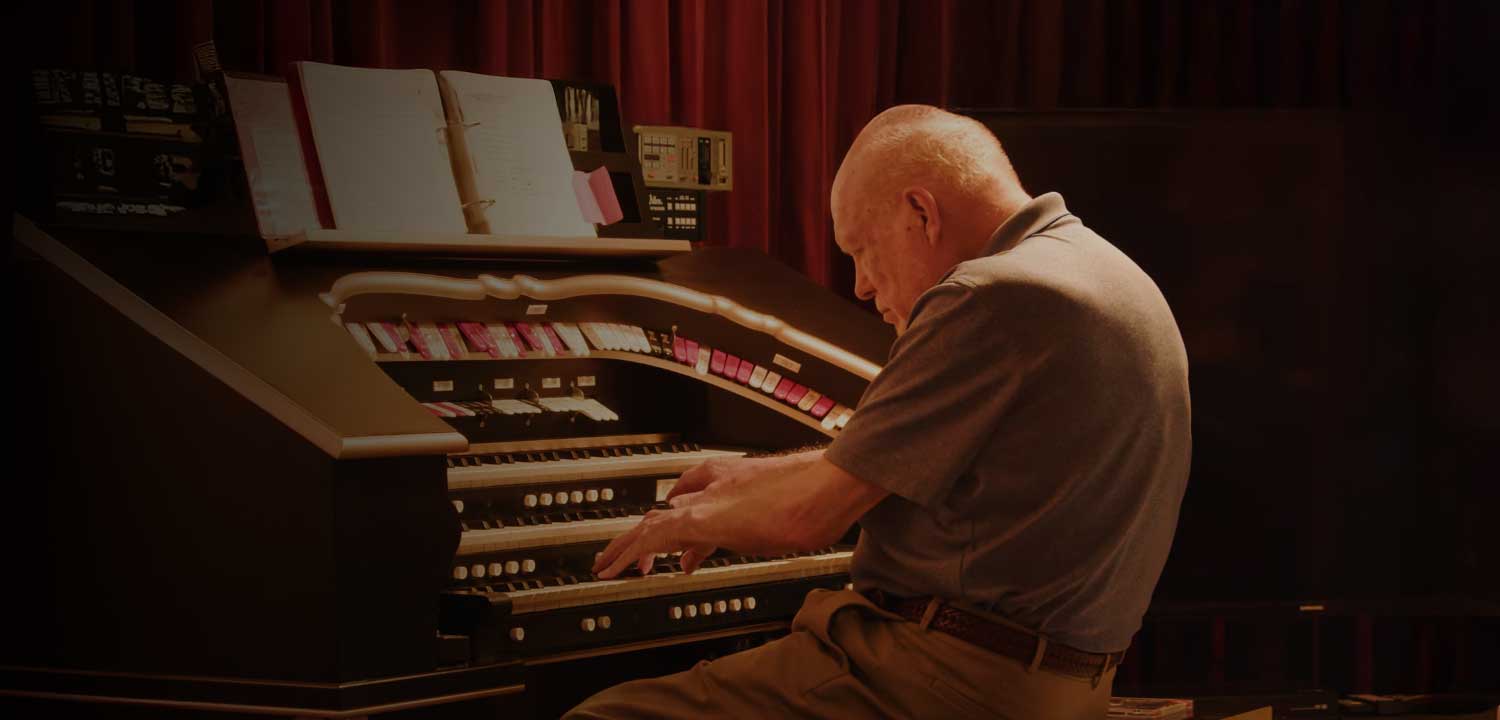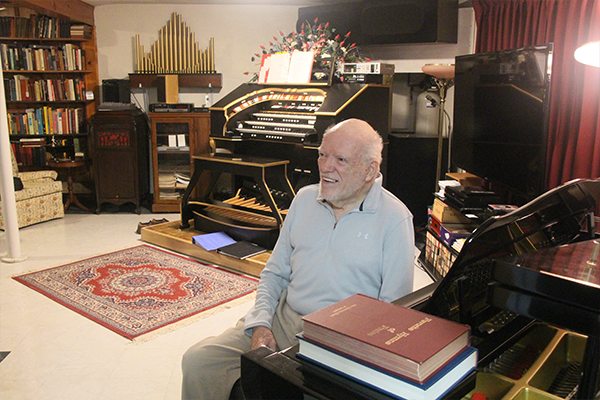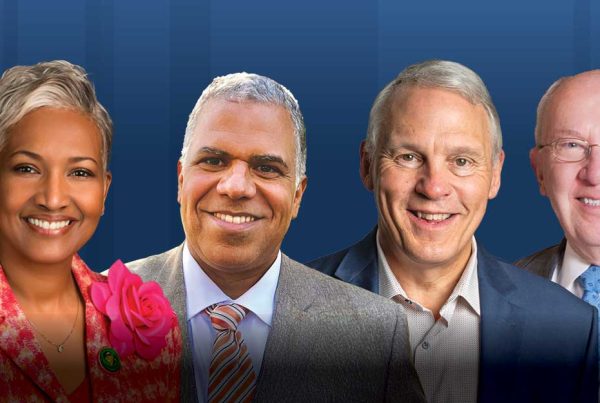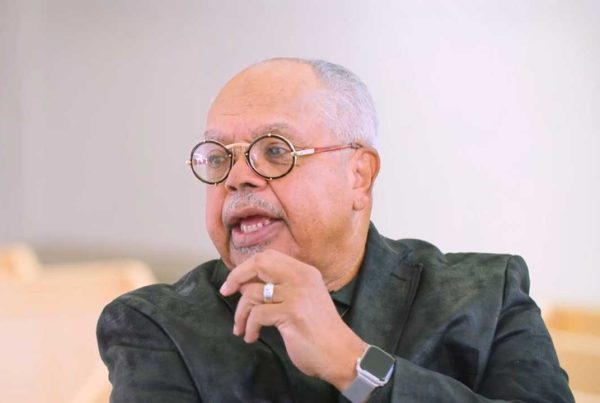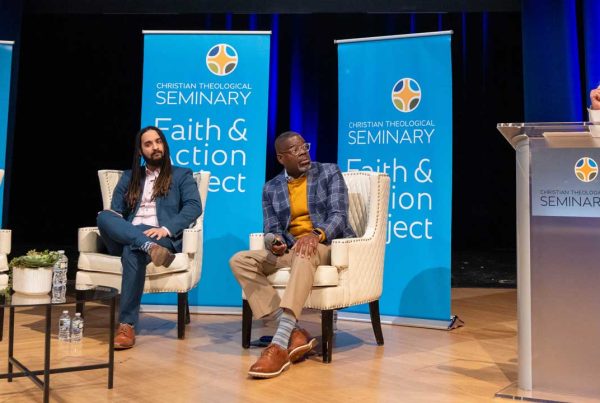Bridging Past & Present Through Music: Dr. John Landon (MDiv ’69)
By Stephanie Seeger (MDiv ’17)
In the last year, I have enjoyed the great blessing of developing a friendship with Dr. John Landon (MDiv ’69). While meeting fellow CTS alumni always results in learning new and interesting facts, my visits with Dr. Landon stand out. His is a legacy that crosses generations and binds the nostalgia of “the good old days” with the technology of today. A visit with Dr. Landon lifts my spirits, inspires my soul, and reminds me that while our lives are woven from diverse experiences across different times, each thread remains part of a singular tapestry, shaping us along the way.
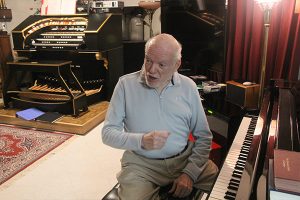 I first met Dr. Landon in February of 2024 at the suggestion of my colleague Charlie DeMaio. Charlie had visited John at his house the previous summer and raved about his musical collection and expertise, sharing that “His music collection is world class and echoes the cultural history of generations.” As a lover of classic vinyl, I knew I had to plan a visit myself. You see, John doesn’t just appreciate music… it is part of the very fiber of his being. Now retired from his career as a minister, social worker, professor, and organist, Landon keeps a collection of instruments, technology, and music in his home that any museum would envy. His basement holds multiple pianos, organs, phonographs, tube radios, and pipes. His office shelves are lined with 5,000 10inch 78rpm records, most of which he has recorded onto his computer and can burn onto CD in minutes. His bookcases contain volumes he has written on everything from his love affair with the pipe organ to the history of social work and his family upbringing. Like the vinyl records he loves, he has found myriad ways to record the things he loves so that he can share them with others.
I first met Dr. Landon in February of 2024 at the suggestion of my colleague Charlie DeMaio. Charlie had visited John at his house the previous summer and raved about his musical collection and expertise, sharing that “His music collection is world class and echoes the cultural history of generations.” As a lover of classic vinyl, I knew I had to plan a visit myself. You see, John doesn’t just appreciate music… it is part of the very fiber of his being. Now retired from his career as a minister, social worker, professor, and organist, Landon keeps a collection of instruments, technology, and music in his home that any museum would envy. His basement holds multiple pianos, organs, phonographs, tube radios, and pipes. His office shelves are lined with 5,000 10inch 78rpm records, most of which he has recorded onto his computer and can burn onto CD in minutes. His bookcases contain volumes he has written on everything from his love affair with the pipe organ to the history of social work and his family upbringing. Like the vinyl records he loves, he has found myriad ways to record the things he loves so that he can share them with others.
Within minutes of being welcomed into Dr. Landon’s home, I feel like I belong. There is something about his quiet demeanor and warm presence that is disarming in a positive way. He asks me to sit down in his perfectly decorated parlor as he begins to share a bit of his story with me, promising that once I am familiar with his background we will explore his musical archives. I learn that his love of music, much like his faith and caring nature, was fostered by his mother, father, and siblings in his childhood home. Born the youngest of four children on a small farm near Marlette, Michigan, Dr. Landon grew up in a home without electricity, indoor plumbing, or central heating. One thing his home did not lack was the warmth of great love. He recalls living in such close quarters with his siblings and parents fondly, reminiscing on family prayers and daily worship. Thus began his love for music and his strong faith. The family would gather after breakfast to sing hymns together, a practice that took place without exception. As a child, he began taking piano lessons with one of his sisters. He did not practice nearly as much as his sister (much to her chagrin), as he found that he could play music by memory and find notes easily. Their teacher thought this a sign of great talent, but John humbly claims it was just his way of getting around learning the music (I tend to think his teacher was on to something). He played the piano by ear, never needing to read sheet music. To this day, he has a binder which contains his organ playing repertoire not with sheet music, but with notes to jog his memory, and his fingers and feet take it from there.
 He learned more than an appreciation for music at home. His great capacity to care for others was modeled for him by his mother. “I resolved early in my ministry to be non-judgmental and compassionate. I did this largely because of my mother’s influence. She took seriously the Biblical admonition, ‘Judge not that you be not judged.’ She might disagree with someone’s behavior, but she left the judging to God. Based on her example I came to believe that God’s love is unconditional. My mother also and always demonstrated compassion in her daily encounters with people, a needy neighbor, a crying child, or an anguished friend. Thus God has called us to love one another as God has loved us,” he shares. This resolve had a profound impact on his ministry and led him to pursue a master’s degree in social work.
He learned more than an appreciation for music at home. His great capacity to care for others was modeled for him by his mother. “I resolved early in my ministry to be non-judgmental and compassionate. I did this largely because of my mother’s influence. She took seriously the Biblical admonition, ‘Judge not that you be not judged.’ She might disagree with someone’s behavior, but she left the judging to God. Based on her example I came to believe that God’s love is unconditional. My mother also and always demonstrated compassion in her daily encounters with people, a needy neighbor, a crying child, or an anguished friend. Thus God has called us to love one another as God has loved us,” he shares. This resolve had a profound impact on his ministry and led him to pursue a master’s degree in social work.
Dr. Landon struck out to attend college at Taylor University in Indiana. Though he missed his family dearly, he thoroughly enjoyed learning and growing alongside peers, and a passion for lifelong learning fanned into flame. He continued his education at seminary, attending Christian Theological Seminary while serving as Pastor at New Victory Chapel Church in Noblesville, Indiana. He often played the organ at the Anderson Paramount Theater, an exquisite historic building with incredible acoustics. He went on to earn Master and Doctorate degrees in social work while serving as a social worker in Iowa. In 1971, he moved to Lexington, Kentucky to teach Social Work at the University of Kentucky. He eventually worked his way up to Associate Dean of the College of Social Work, but he never stopped sharing his gift of music. Dr. Landon played the organ anywhere he could, from churches to the Kentucky Theater. He also served his calling as an assistant pastor at Gardenside Baptist Church in Lexington.
At one point, Landon briefly moved to Florida. He couldn’t find a church with a traditional worship service, so he started one himself. Given the large population of retirees, he believed that people who shared his love for traditional music would come, and he was right. The church’s first service in his own home drew 35 people to crowd in. The congregation moved, first to a storefront shop, and finally to a church building generously purchased by two congregants who believed in the value of the faith community.
After a few years, Landon returned to Lexington to serve as pastor of Gardenside Baptist Church. The retiring pastor had called and personally asked him to return because of the strong relationships he already had with the congregation. He obliged and served for 5 years as Senior Pastor. During that time, he got them on local television, and more people started attending as awareness of the congregation grew. His organ concerts were also a draw, but it was his pastoral care that truly defined his ministry. He made it a priority to connect with his congregation beyond the pulpit—visiting members in their homes and hospitals, offering counsel in times of need, and ensuring that each person felt seen, heard, and valued. Through his compassionate leadership, Gardenside Baptist Church became not just a place of worship, but a community where people felt genuinely cared for and uplifted.
Whether through the power of a hymn or the comfort of a hospital visit, he believes that both ministry and social work are about meeting people where they are—physically, emotionally, and spiritually. Landon suggests that caring for people should involve serving the whole person and all parts of their lives, not just the parts of them that show up in church on Sunday mornings. He recalls talking to a fellow pastor who was uncomfortable visiting congregants at the hospital and shares his surprise. To Dr. Landon, pastoral care through visitation is inextricable from preaching ministry. He reflects, “People [in the hospital] don’t expect a sermon. They expect you to come in and talk with them about how they’re feeling, how the family is doing, and have a word of prayer with some comfort in it. When some of those people got better from their ailments they came to church because they felt like somebody there was concerned about them, and I was. It was a genuine concern.”
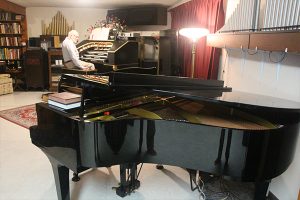 This brings us up to speed, so we can return to the musical magic. Dr. Landon currently lives in his 3rd house in Lexington. His prior homes did not have rooms big enough for a pipe organ, which led him to ask his realtor to find a home with a space where he could house a full-sized organ. She found a ranch with a large basement, and after renovating one basement room to remove the ceiling and floor from the first level, he finally had the two-story room he needed for a home organ. The rest of the basement is chock full of pianos, a theater organ, and boxes upon boxes of player piano rolls. He has arranged a seating area such that small groups of people can come hear him play and share his joy. When you step off the final stair and look around, it’s as if you’ve been transported to a bygone era of music halls and swinging jazz. My face lights up like a kid in a candy shop, and as I look at John I notice his excitement mirrors my own. The joy he feels immersed in his world of music is palpable and has clearly never faded.
This brings us up to speed, so we can return to the musical magic. Dr. Landon currently lives in his 3rd house in Lexington. His prior homes did not have rooms big enough for a pipe organ, which led him to ask his realtor to find a home with a space where he could house a full-sized organ. She found a ranch with a large basement, and after renovating one basement room to remove the ceiling and floor from the first level, he finally had the two-story room he needed for a home organ. The rest of the basement is chock full of pianos, a theater organ, and boxes upon boxes of player piano rolls. He has arranged a seating area such that small groups of people can come hear him play and share his joy. When you step off the final stair and look around, it’s as if you’ve been transported to a bygone era of music halls and swinging jazz. My face lights up like a kid in a candy shop, and as I look at John I notice his excitement mirrors my own. The joy he feels immersed in his world of music is palpable and has clearly never faded.
He begins to explain what is in the room piece by piece, weaving in relevant stories and memories like a master storyteller. He shows me his player piano and explains that when the holes in paper music rolls align with the holes in its metal plate, a vacuum sucks the note down and the song plays. He demonstrates the way it can be powered by foot pedal (an impressive workout) or by motor. We walk past a working tube radio into the room with the classic full-size organ, and my eyes hardly know where to land. The walls are filled with player piano rolls. I notice an old Victrola phonograph, and Dr. Landon pulls out a vinyl record as thick as a pancake to play. As the Big Band music plays, he explains that this Victrola does not have internal speakers, but rather plays the music through an internal horn. He shows me the Leslie tone cabinet next to the organ. The speaker is named for its inventor, Donald Leslie, who started working in the late 1930s to develop a speaker for the Hammond organ that more closely mimicked the sound of a pipe or theater organ. Leslie found that rotating baffles along the axis of the speaker cone produced the most effective sound, and when Dr. Landon demonstrates by playing the organ, I can feel the vibrations of the rich sound in my bones.
As we walk back to the main room, he stops to put a square disk into a piano. “Now I’ll play a duet with George Gershwin,” he says. “Gershwin died in 1937, the year I was born, but this disk has a recording of him playing a piece live. The recording captures his expression, so the piano will play it as if Gershwin is here himself.” John then walks to his theater organ and accompanies the classic composer, and I am suddenly transported to the Roaring Twenties. As Gershwin stops, John moves on to play his mother’s favorite hymn “Trust and Obey,” followed by some Mozart.
I ask Dr. Landon what it feels like when he gets lost in the music. “It’s been a blessing to me. When I am depressed and I am sad, or when I’m feeling really good and on top of the world, I come down to this organ and play something, and it’s just like a benediction. The music flows and I just enjoy it, and I thank God for the gift,” he says.
 We realize nearly 3 hours have passed, and Dr. Landon insists we make our way back upstairs so that he can copy some of my favorite music to send home with me. This is his hobby outside of playing the organ – cataloging and sharing the records he loves so dearly. Dr. Landon’s generosity is paramount. While his musical equipment is quality enough to warrant display in a museum behind lock and key, he gladly shares it with friends and community members. His collection of records sits in a large office ready to be copied for visitors who share the type of music they enjoy, and he can ALWAYS find an album (or 5) to burn to a CD that he thinks they would enjoy and insists they take home as a gift. My music of choice? Bing Crosby. Dr. Landon copies 5 rare recordings of Bing onto CDs for me to take home, and a week later I receive a package in the mail containing more.
We realize nearly 3 hours have passed, and Dr. Landon insists we make our way back upstairs so that he can copy some of my favorite music to send home with me. This is his hobby outside of playing the organ – cataloging and sharing the records he loves so dearly. Dr. Landon’s generosity is paramount. While his musical equipment is quality enough to warrant display in a museum behind lock and key, he gladly shares it with friends and community members. His collection of records sits in a large office ready to be copied for visitors who share the type of music they enjoy, and he can ALWAYS find an album (or 5) to burn to a CD that he thinks they would enjoy and insists they take home as a gift. My music of choice? Bing Crosby. Dr. Landon copies 5 rare recordings of Bing onto CDs for me to take home, and a week later I receive a package in the mail containing more.
It is hard to leave, but I know the joy Dr. Landon has shared with me will not dissipate outside these walls. I feel inspired, hopeful, playful, and happy. There is something about sitting in the presence of someone who loves what they do that makes one grateful for God’s blessings. I realize that John’s gift of music is more than a hobby; it is a ministry that emanates powerful blessing to everyone it touches. I ask Dr. Landon if he has any parting advice for future CTS students, and he leaves me with this: “Cultivate your empathy for people, because there is nothing more important than that. Education is very important. If you add education to empathy, that’s wonderful. If you have empathy and no education you’re more limited, so you want to strive for both.”
 It is only appropriate to conclude a story about John by bringing it all back to the foundation: his unshakable faith and profound gratitude to be able to serve those around him. As he shares at the end of his autobiography, “Throughout my life I have felt the hand of God upon me, guiding me through the maze of this life. Is it any wonder that now I thank him and praise him for his guidance and leading me through it all?” Dr. Landon’s life is a testament to the power of passion, compassion, and connection. Whether through the music he shares, the wisdom he imparts, or the kindness he extends, his influence continues to resonate and connect people in genuine community. In him, I have found not only a dear friend but also a living bridge between past and present—a reminder that the wisdom of those who came before us continues to guide and enrich our journeys today, just as Dr. John Landon has enriched mine.
It is only appropriate to conclude a story about John by bringing it all back to the foundation: his unshakable faith and profound gratitude to be able to serve those around him. As he shares at the end of his autobiography, “Throughout my life I have felt the hand of God upon me, guiding me through the maze of this life. Is it any wonder that now I thank him and praise him for his guidance and leading me through it all?” Dr. Landon’s life is a testament to the power of passion, compassion, and connection. Whether through the music he shares, the wisdom he imparts, or the kindness he extends, his influence continues to resonate and connect people in genuine community. In him, I have found not only a dear friend but also a living bridge between past and present—a reminder that the wisdom of those who came before us continues to guide and enrich our journeys today, just as Dr. John Landon has enriched mine.
- Dr. John Landon sits at a piano in his basement musical museum.
- A collection of CD recordings of Dr. John Landon playing the organ and preaching.
- Dr. John Landon puts a vinyl record on a Victrola record player. This Victrola has a motor to run without a hand crank and emits music through an internal horn rather than speakers.
- One of Dr. John Landon’s class vinyl record players. This one runs by hand crank and plays 78rpm records.
- Dr. John Landon plays piano in his basement.
- Dr. John Landon’s office contains shelves and shelves full of vinyl records, as well as recording equipment to transfer vinyl recordings to CDs.
- A shelf in Dr. John Landon’s home contains stacks of cassette tape recordings of his organ music and sermons.
- Three books Dr. John Landon shared with CTS about his life, family, and career. They include Dr. Landon’s autobiography “God’s Leading Hand Begins: From Farm to Pulpit and Podium”; “The Development of Social Welfare” by John W. Landon, Ph.D.; “Little Farm House in the Thumb,” a family biography about growing up by his sister Ruth Landon Sissom.
- Dr. John Landon sits at a piano in his basement musical museum.

